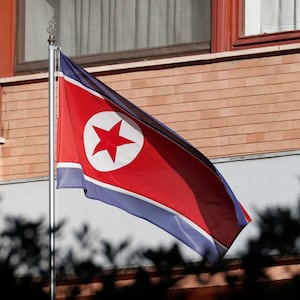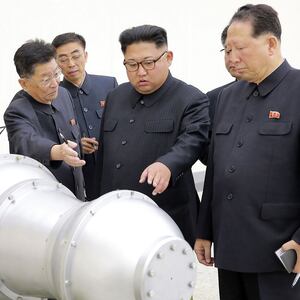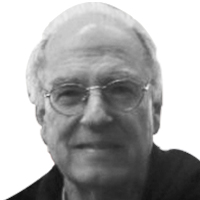ROME—North Korea’s embassy here is tucked away in an affluent suburb that Benito Mussolini created for a 1942 World's Fair that never happened. The building that houses both the residence and the chancery is a flat-roofed orange-brick structure with narrow horizontal windows and a gangling antenna that surely is not for Italian television. A narrow back alley is blocked to traffic and the front gate is fortified, but no police or even private security guards are anywhere to be seen. The only thing that differentiates it from the rest of the houses along the street is a sign in Korean, the flag, and surveillance cameras that hang like Christmas ornaments from the umbrella pines and other trees nearby.
Neighbors say that more than 20 people work in the building, but they all go in and out through the back. They attract as little attention as possible.
That changed last week when news broke that Pyongyang’s acting ambassador to Italy, Jo Song Gil, had defected. Now, suddenly, this orange house in a quiet neighborhood appears at the epicenter of an international incident with implications that stretch from Donald Trump’s White House to Moon Jae-in’s Blue House in Seoul and Kim Jong Un’s “Central Luxury Mansion” in Pyongyang.
ADVERTISEMENT
Depending on how it’s handled, Jo’s defection could threaten plans for a new Trump-Kim summit that’s very much needed to clarify the many, many issues about North Korean nukes and missiles left open by the get-together in Singapore last June, despite Trump's claim that the problem was "largely solved."
Jo Song Gil, his wife, and possibly one or two children remain under the protection of Italian authorities, according to sources in Seoul, while South Korea's government has indicated it would rather not take him in, and the Americans worry about how to respond.
While in Rome, Jo apparently was not a patron of the most famous local restaurant and landmark, called “Il Fungo,” The Mushroom. Instead, he reportedly had a penchant for bucatini all'amatriciana, which he often ate at a restaurant called Laganà, according to former parliamentarian Antonio Razzi, who says he first met Jo on a state visit to North Korea about a decade ago. Razzi told La Repubblica that the North Korean “loved our cuisine” but that he also loved his country, so was shocked to hear he defected.
Whether Italian cooking of other aspects of la dolce vita played a part in Jo’s decision to defect is a matter of pure speculation, of course.
For President Donald Trump, certainly, the timing is most inopportune. U.S. and North Korean diplomats reportedly have been engaged in intense secret talks in Hanoi over the time and place for Trump’s second summit with Kim, and Trump has said he expects a decision quite soon.
Munhwa Ilbo, Seoul's only afternoon paper, reported Monday that the Vietnamese capital is the likeliest venue. And on Tuesday Kim Jong Un; his wife, Ri Sol Ju; top negotiator Kim Yong Chol, and North Korea’s foreign and defense ministers arrived in Beijing for talks at the invitation of China’s President Xi Jinping — reaffirmation of the tightness of North Korea’s bond with China and a chance to talk over strategy vis-a-vis both Trump and Moon.
Under such precarious circumstances, the last thing the South Koreans want is for Jo's defection to delay or derail carefully wrought relations with Kim or the delicate process of setting up a Trump-Kim summit — a real risk if he shows up in Seoul.
"They don't want him here," said Choi Jin-wook, former head of the Korean Institute of National Unification, who's spent years watching North Korea.
Choi believes one of Jo's main jobs in the North Korean embassy in Rome was to oversee the purchase of luxury goods for the North Korean elite. He had taken several trips to Trieste in northern Italy to visit luxury bathroom fixture factories and warehouses during his time in Italy. But Jo may also have been interested in more than bidets. North Korean diplomats around the world often are involved in other rackets, including drug smuggling.
The defection of the 44-year-old diplomat comes as a particular blow to the North Koreans since he’s from a privileged diplomatic family. His grandfather, his father, and his father-in-law were all ambassadors, according to sources in Seoul.
Jo, the number two person in the embassy since arriving in Italy in 2015, took over as acting ambassador when the ambassador was expelled by the Italian Foreign Ministry after North Korea conducted its sixth underground nuclear test in September 2017. North Korea has not conducted another nuclear test since, and a new man, who was about to become ambassador when Jo's tour ended in November, is already in place.
South Korean officials already have their hands full with the last high-level diplomatic North Korea defector, Thae Yong-ho, who was the deputy ambassador in London when he left with his wife and two children in 2016. Despite reports that authorities in Seoul have tried to curb his activities, he has been a high-profile speaker at events that The Daily Beast has attended in the South Korean capital. Thae penned a blog post over the weekend telling Jo that coming to South Korea was “an obligation, not a choice” and that he and his family check daily for news about Jo and his family.
Then, on Tuesday, Thae made matters worse for Moon by heading a “citizens coalition” of influential conservative figures in Seoul demanding Jo's “safe return.” It was “not certain,” said their statement, that Jo and his family were “receiving appropriate security protection from Italian authorities" and would be able to "depart on their path of seeking asylum.”
Thae sought to make his appeal more palatable to the Moon government by saying that together he and Jo could work for unification of the two Koreas. Other North Korean diplomats might follow, he said, suggesting a mass defection that is clearly not what Moon and his top aides would like to see.
Choi noted, significantly, that Thae defected in London in August 2016, at a very different political moment, when President Moon's conservative predecessor, Park Geun-hye, was in office. Moon took over as president in a snap election in May 2017 after she was impeached, ousted and jailed in Korea's Candlelight Revolution.
Steve Tharp, a retired U.S. army officer who has made a career analyzing North Korea issues, said there was "a certain embarrassment in having [Thae] come here" but also noted, the South Koreans "can control him" by barring him from public appearances and the media.
For Moon, the danger of Jo's making South Korea his home is paramount.
Jo "knows very well he will not be welcome by the South Korean government," said Kim Tae-woo, a professor at Konyang University and long-time military analyst. "If he comes here, he will be a burden."
There has even been speculation that the South Koreans might want to send Jo back to North Korea, where he would face certain execution, or that Kim —who allegedly had his own half brother murdered with VX nerve agent in Malaysia—would attempt to have him assassinated on South Korean soil.
"Many South Koreans are warning Jo not to go to South Korea," tweeted Tara O, an analyst of North Korea issues in Washington. "The Moon administration would likely send him back to North Korea to please Kim Jong Un."
In fact, Moon's government would much prefer that Jo either remain in Italy or go to the U.S. as he reportedly wants to do.
"He should settle in the U.S.," said Kim Tae-woo. "If we have a different government in South Korea, he may come here."
In the meantime, Jo's defection has not been officially acknowledged by Pyongyang. North Korea, which has denounced Thae as "human scum," has said nothing about it, and U.S. and South Korean officials have no comment either.
The source remains South Korea's multi-tentacle National Intelligence Service, which briefed members of the National Assembly about the defection last week. Reluctance even to acknowledge it is another sign of the sensitivities.
"His defection will have a ripple effect," said Kim Sung-hak, North Korea expert at Hanyang University. "It is safer for him in the U.S. than in the South. South Korea doesn't want him to be a liability. It is not safe here."
Barbie Latza Nadeau reported from Rome. Donald Kirk reported from Seoul.








